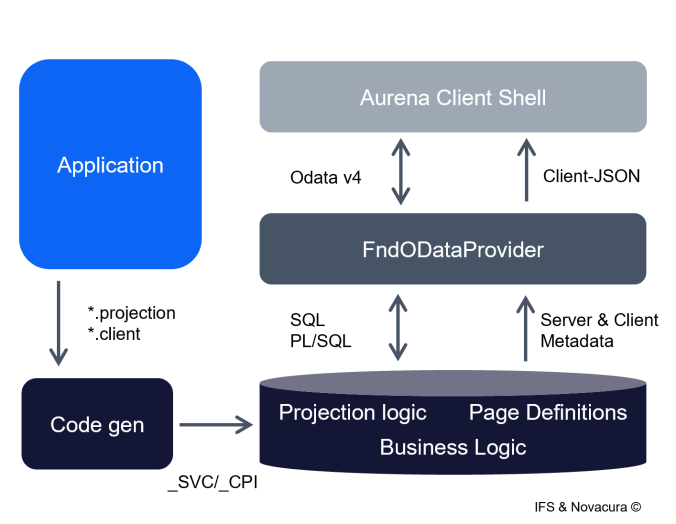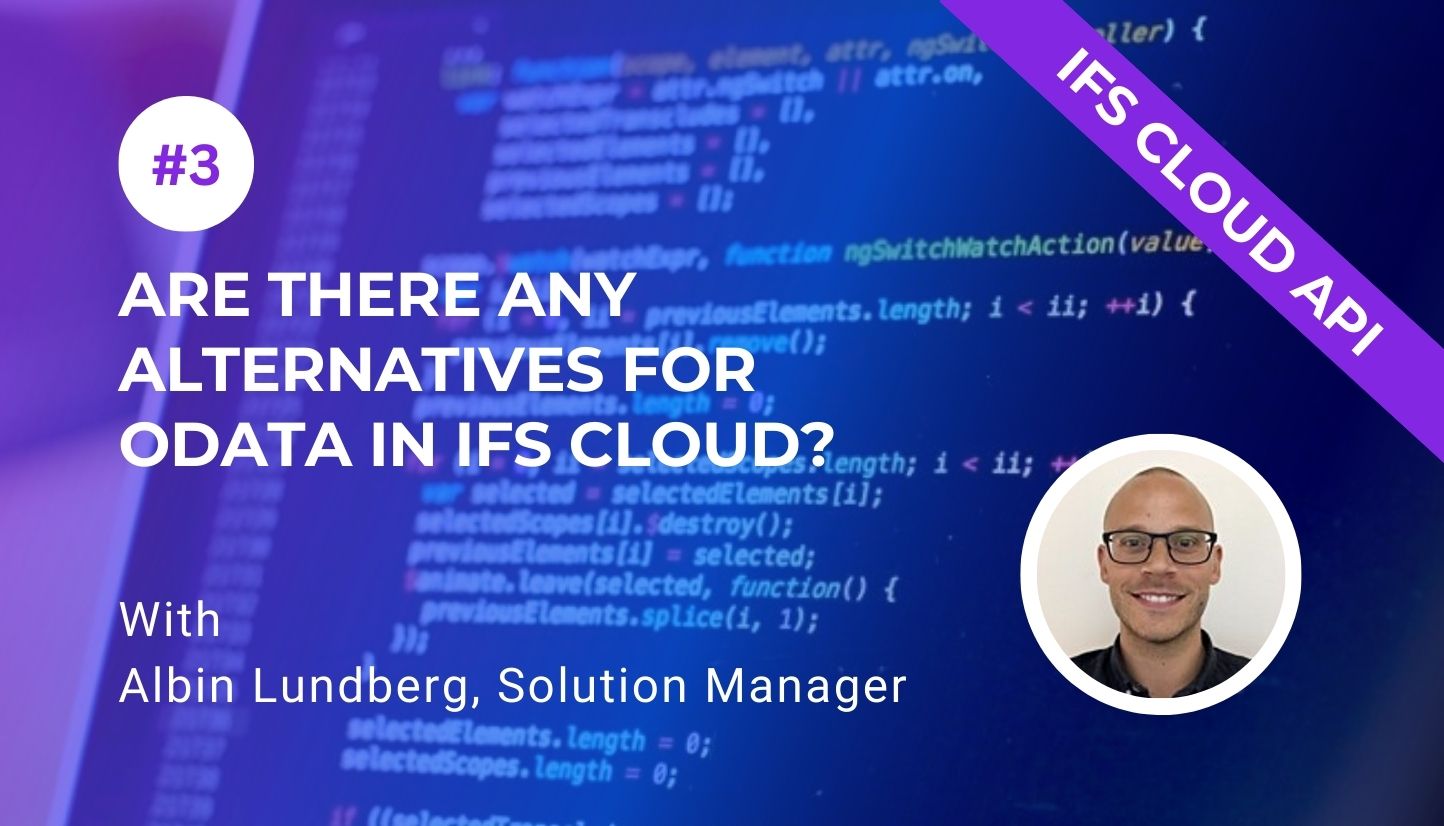 January 8, 2025
January 8, 2025  6 min to read
6 min to read The OData programming model enables extensive product integration and improved data exchange performance. When building OData in an IFS Cloud environment, users can accelerate the entire innovative approach to optimize performance. But OData might be not the only alternative for IFS Cloud.
In our previous article, we discussed several cases of how to replicate database transactions in OData. Now we will focus on finding an alternative to OData in IFS Cloud.
Novacura has been exploring the topic of OData for years and, as an experienced partner of IFS, has gained practical knowledge on how to create specific solutions for IFS Cloud. With the deep understanding of our experts, we are sharing our knowledge to increase awareness and confidence among our customers.
Novacura had the opportunity to speak with our expert Albin Lundberg, Novacura Manager Flow Solution and IFS Certified Practitioner – Supply Chain Consultant (IFS Cloud) – 2022. In this article we will generally present some cases that can be seen as an alternative to OData in IFS Cloud.
Is IFS Cloud is still based on its previous functional resources?
In a sense, yes. The Oracle database is still there underneath the FndODataProvider. So, the logical units, views and packages are still there, but in IFS Cloud, the business logic is instead accessed via the OData API.

IFS Aurena Architecture – The most important key components.
Does the PL/SQL API that refers to the .NET access Provider still exist in IFS Cloud?
No.
Referring to the data shared on the official IFS Community forum, it is possible to write new reporting plug-ins to meet the needs of third-party system providers, and IFS also provides some standard options for customers. How can third-party systems continue to access the IFS Cloud and avoid the problems that can arise from the lack of functionality of the OData APIs?
The .NET Access Provider connectors won’t work in the IFS cloud; they are deprecated. There are still options to use IFS connect, External File Interface, and Data Migration. The legacy integration options are most commonly used for “system of records” related data such as invoices, payment files, etc. Other than that, external BI tools, that have complex queries and handles large datasets, can fetch data directly from the database or via Information Sources in IFS. But that topic needs its own blog post.
Can official IFS Partners, such as Novacura, access APIs by implementing IFS customizations?
Yes, it is possible to expose any package or view via customization and custom OData protections. In custom utility packages, you can write your own PL/SQL packages and expose them via OData. However, you need to have the proper skills and certifications to develop and deploy customizations.
When IFS Cloud is installed on-premises in the customer’s data center, the company can access all the objects also available as PL/SQL API. Is there any risk in using them?
In IFS cloud the end users doesn’t have Oracle accounts, they are maintained in the IFS IAM (Identity and Access Manager). It’s possible to configure a direct database connection (ODBC) for fetching data but that comes with security and permission challenges.
The company can’t use them because of licensing or can’t use them because it’s too risky?
I don’t have an answer on the licensing. As mentioned above; accessing the database directly comes with a higher risk, definitely.
If the customer has the full enterprise license of the Oracle database, the company can access all objects stored in Oracle from a legal perspective. Can that also be previously in use PL/SQL APIs?
From my knowledge direct database access in IFS Cloud is only allowed for data harvest with BI tools. But I’m no expert on licensing agreements so I’m not completely sure.
Novacura resources: The official IFS Community forum shared information that the full enterprise license of the Oracle database complies with The ASFU restrictions, and if users are thinking of running a completely different application that uses Oracle as a backend, then it’s not allowed. The IFS license will only cover IFS installations, and users can get into serious trouble if, for some reason, Oracle decides to do a license audit.
Best Practices for Alternative API Use
To ensure successful implementation and minimize risks, follow these best practices when using alternative APIs in IFS Cloud:
Security and Compliance
- Always adhere to IFS and Oracle licensing policies when accessing APIs or database objects.
- Configure strict access controls and use the IFS Identity and Access Manager (IAM) to manage permissions effectively.
Thorough Testing
- Test integrations in a non-production environment to identify potential issues before deployment. This includes stress testing for high-volume transactions and data consistency checks.
Skillful Development
- Engage certified IFS developers with experience in PL/SQL and custom API development to ensure high-quality and secure customizations.
- Document all customizations thoroughly to facilitate maintenance and knowledge transfer.
Plan for Scalability
- Design integrations with future scalability in mind. Consider how the solution will perform as data volumes grow or new systems are added.
Monitoring and Support
- Implement monitoring tools to track the performance of integrations and identify issues proactively.
- Establish a support plan with clear responsibilities for troubleshooting and maintaining integrations.
By carefully selecting and following these practices, businesses can effectively leverage alternative APIs in IFS Cloud, ensuring robust, secure, and efficient integrations tailored to their unique needs.
Summary
There are several alternative approaches to OData in IFS Cloud. In using them, each developer should consider important factors that may affect the execution of the project. Nevertheless, any use of the API solutions should follow IFS policy.
In the next article, we will look at authentication, authorization, and initialization methods in the OData API. To learn more about IFS Cloud, OData, and Novacura services, subscribe to our blog and see related posts.
INTERESTED IN LEARNING MORE ABOUT IFS CLOUD ODATA?
The article you are about to read is part of a broader series on the IFS Cloud OData API. Here's a link to the main article, which lists all the major barriers you may encounter when upgrading to IFS Cloud:
Introduction – barriers you can meet when moving to IFS Cloud and OData API
Below we present a whole list of articles belonging to the IFS Cloud OData series:
- The OData basics in the context of IFS Cloud
- How to replicate database transactions in OData for IFS Cloud
- Alternatives for OData in IFS Cloud
- Authentication, Authorization and Initialization in the OData API of IFS Cloud
- OData Efficiency with the remote cloud installation
- IFS customizations in OData
- Dealing With Legacy Systems






